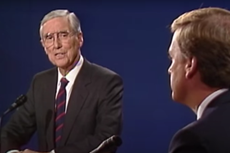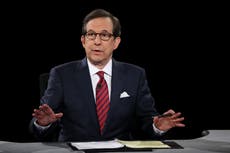How political debates throughout history have made - and broken - candidate's campaigns
History proves that one wrong move during a political debate can tank a politician’s campaign
The outcome of political debates can reshape a campaign, boosting some candidates to frontrunner status and tanking the aspirations of others.
Donald Trump and Democratic presidential nominee Joe Biden met for their first debate on Tuesday, and the debates this election cycle are predicted to be the most-watched television of the fall, as predicted by media consultant Brad Adgate in a recent Forbes story.
“With the pandemic curtailing campaign rallies, a polarized political climate, the ratings spike of newscasts, the lack of original programming content on competitive cable networks, an unpredictable president who constantly courts media attention (including expected complaints about the moderator and format) and recent debates setting TV audience records, the 2020 debates could average 100 million viewers, joining ten Super Bowls (including this year’s) and the M*A*S*H finale in 1983 to reach that audience threshold,” he wrote.
Despite the intense viewership, it's unlikely that either Mr Trump or Mr Biden will see huge swings either way, as the polarised American public has mostly made up their minds on who they'll be voting for in November.
Traditionally, general election debates don't tend to end campaigns, as voters tend to have only one option that aligns with their political ideology.
"Generally, with general election debates, it is typically not the case that there are large swings following one's debate performance," Dr Mitchell McKinney, professor of political communication and director of the Political Communication Institute at the University of Missouri, said.
A debate completely derailing a campaign tends to happen during the primaries, when voters have more options, and candidates have less time on stage to define themselves.
During the 2012 Republican primary debates, former governor of Texas Rick Perry made a slip that has come to define his brief career as a national-level political figure.
While Mr Perry's campaign was arguably on the downslide even before the debate, a gaffe he made while answering a question undermined what little hope he had left.
Mr Perry was explaining that he wanted to abolish three agencies within the federal government, and began to list them, but stumbled and forgot the third agency he was proposing to abolish. The audience laughed as he tried to play off the fumble, and he jokingly named the Environmental Protection Agency as the third. A moderator pressed him on the issue and he attempted to course correct.
"The three agencies I would do away with is the education, the, uh, commerce, and, let's see. The third one I can't. I can't. Oops," he said.
That moment came to mark the effective end of Mr Perry as a viable Republican candidate in the 2012 race.
Dr Todd Graham, the Director of Debate at Southern Illinois University, known by some as "America's Debate Coach," pointed to the 2016 Republican primaries and specifically to Texas Senator Ted Cruz's inability to debate against Mr Trump.
"Ted Cruz was a national champion debater, yet in the first several debates against Trump he got his hat handed to him. He wasn't used to Trump. He wasn't used to someone interrupting, to someone using ad homenim attacks," Dr Graham said. "No one was able to overcome Trump."
Mr Trump throttled Mr Cruz during the debates, saddling him with the moniker "Lyin'Ted" and suggesting he was "like a little bit of a maniac" in the way he conducted his business in the Senate. During another debate, he suggested Mr Cruz was the "single biggest liar I have ever dealt with in my life" and compared him to a "little baby. Soft, weak, little baby."
Mr Cruz dropped out of the primaries in May of 2016.
Though most campaign-ending debates occur during the primaries, there is at least one example of a general election debate tanking a candidate's aspirations.
During the 1988 presidential debate between Republican George H W Bush and Democrat Michael Dukakis, Mr Dukakis was asked a question about the death penalty. Mr Dukakis was a vocal opponent of capital punishment, and his critics painted him as being an intellectually cold person.
CNN moderator Bernard Shaw opened the debate by asking Mr Dukakis a question that has become infamous among scholars of presidential elections and campaigns.
''Governor, if Kitty Dukakis were raped and murdered, would you favor an irrevocable death penalty for the killer?'' Mr Shaw asked.
"No, I don't, Bernard, and I think you know that I've opposed the death penalty during all of my life. I don't see any evidence that it's a deterrent and I think there are better and more effective ways to deal with violent crime," Mr Dukakis answered.
Mr Dukakis' answer was well reasoned, to the point, and unwavering. But his lack of emotional reaction to the premise didn't sit well with the American public.
Dr Tammy Vigil, associate professor of communication at Boston University who has authored books on presidential debates and rhetoric, said that moment dealt a major blow to Mr Dukakis presidential aspirations.
"It was a total setup question - and the idea was that he'd respond with some emotion, but he gave a very reasoned response. People wanted an impassioned response, and afterwards his polling sank, because instead of showing compassion, he gave a principled response," Dr Vigil said. "So folks didn’t connect with him. That one question in one moment was a key pivot in the campaign. of course there were other things that happened after that, but that debate, that moment, there was a clear pivot in the polling dat that you could attribute specifically to that answer."
Join our commenting forum
Join thought-provoking conversations, follow other Independent readers and see their replies
Comments

Bookmark popover
Removed from bookmarks